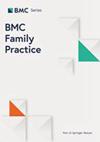Classification system for primary care provider eConsults about medications for older adults with frailty
IF 3.2
3区 医学
Q1 MEDICINE, GENERAL & INTERNAL
引用次数: 0
Abstract
Providing primary care for people with frailty can be challenging due to an increased risk of adverse outcomes and use of potentially inappropriate medications which may exacerbate characteristics of frailty. eConsult is a service where primary care providers can receive timely specialist advice for their patients through a secure web-based application. We aimed to develop a classification system to characterize medication-focused eConsult questions for older adults with frailty and assess its usability. A classification system was developed and refined over three cycles of improvement through a cross-sectional study of 35 cases categorized as medication-focused from cases submitted in 2019 for patients aged 65 or older with frailty through the Champlain BASE eConsult service (Ontario, Canada). The final classification system was then applied to each case. The classification system contains 5 sections: (1) case descriptives; (2) intent and type of question; (3) medication recommendations and additional information in the response; (4) medication classification; and (5) potentially inappropriate medications. Among the 35 medication-focused cases, the most common specialties consulted were endocrinology (9 cases, 26%) and cardiology (5 cases, 14%). Medication histories were available for 29 cases (83%). Many patients were prescribed potentially inappropriate medications based on explicit tools (AGS Beers Criteria®, STOPPFall, Anticholinergic Cognitive Burden Scale, ThinkCascades) yet few consults inquired about these medications. A classification system to describe medication-related eConsult cases for patients experiencing frailty was developed and applied to 35 eConsult cases. It can be applied to more cases to identify professional development opportunities and enhancements for eConsult services.初级保健提供者关于体弱老年人用药的电子咨询分类系统
eConsult 是一种服务,初级保健提供者可以通过安全的网络应用程序及时获得专家对患者的建议。我们的目标是开发一套分类系统,用于描述针对虚弱老年人的以用药为重点的 eConsult 问题,并评估其可用性。通过对 2019 年通过 Champlain BASE eConsult 服务(加拿大安大略省)为 65 岁或以上体弱患者提交的病例中被归类为以药物治疗为重点的 35 个病例进行横断面研究,开发并在三个改进周期内完善了分类系统。然后将最终分类系统应用于每个病例。该分类系统包含 5 个部分:(1)病例描述;(2)问题的意图和类型;(3)用药建议和回复中的附加信息;(4)药物分类;以及(5)潜在的不适当药物。在 35 个以用药为重点的病例中,最常咨询的专科是内分泌科(9 例,占 26%)和心脏病科(5 例,占 14%)。有 29 个病例(83%)提供了用药史。根据明确的工具(AGS Beers Criteria®、STOPPFall、抗胆碱能认知负担量表、ThinkCascades),许多患者被处方了可能不合适的药物,但很少有咨询者询问这些药物。我们开发了一套分类系统,用于描述体弱患者与药物相关的电子会诊病例,并将其应用于 35 例电子会诊病例。该系统可应用于更多病例,以确定电子会诊服务的专业发展机会和改进措施。
本文章由计算机程序翻译,如有差异,请以英文原文为准。
求助全文
约1分钟内获得全文
求助全文
来源期刊

BMC Family Practice
医学-医学:内科
CiteScore
3.20
自引率
0.00%
发文量
0
审稿时长
4-8 weeks
期刊介绍:
BMC Family Practice is an open access, peer-reviewed journal that considers articles on all aspects of primary health care research. The journal has a special focus on clinical decision making and management, continuing professional education, service utilization, needs and demand, and the organization and delivery of primary care and care in the community.
 求助内容:
求助内容: 应助结果提醒方式:
应助结果提醒方式:


